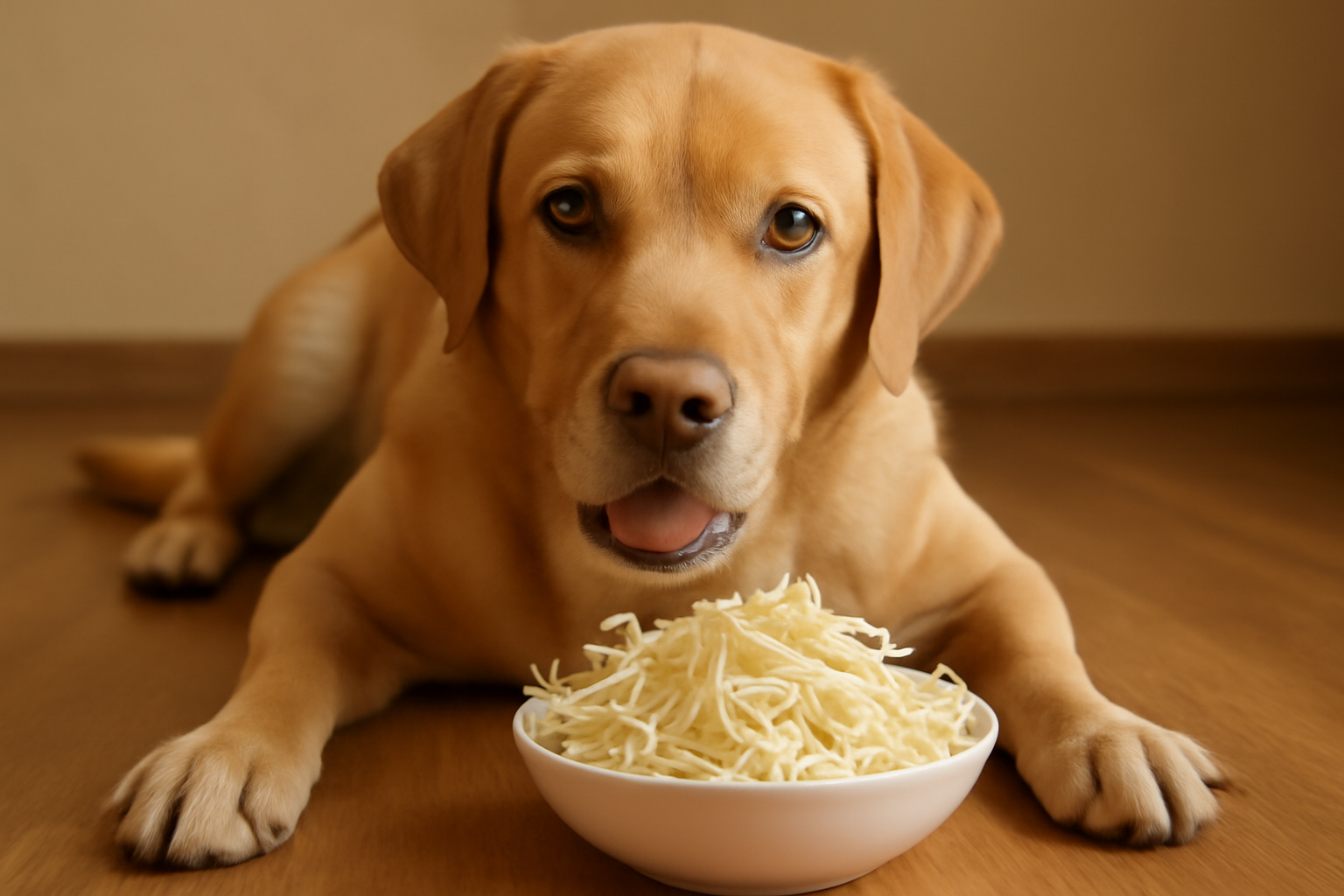Can Dogs Eat Bean Sprouts? 🐕🌱
If you’ve ever enjoyed a fresh salad or stir-fry, you may have come across bean sprouts. These crunchy and nutritious little greens are often used in many dishes around the world, adding a fresh texture and a mild flavor. But what about your dog? Can they eat bean sprouts too? 🤔
Bean sprouts are not toxic to dogs and can be a healthy treat when given in moderation. However, like with all human foods, it’s important to understand the benefits, risks, and how to serve them properly to keep your dog safe. In this article, we will answer all your questions about bean sprouts and dogs.
Let’s explore whether bean sprouts are good for your dog, the benefits and risks, how to feed them safely, and what to keep in mind when introducing new foods into your dog’s diet.
What Are Bean Sprouts? 🌱
Bean sprouts are the young shoots that grow from beans like mung beans, lentils, or soybeans. They are typically small, thin, and pale with a delicate, crisp texture. These sprouts are highly nutritious and are often used in Asian cuisines, especially in stir-fries, salads, and soups.
Bean sprouts are packed with fiber, vitamins, and minerals. They are a low-calorie food that provides essential nutrients, which makes them a great option for people looking to add healthy foods to their diets. But are these same benefits safe for your dog? Let’s find out!
Can Dogs Eat Bean Sprouts Safely? 🐶
The good news is that dogs can eat bean sprouts in moderation! In fact, bean sprouts can be a nutritious snack or treat for your dog, offering a variety of benefits like improved digestion, healthy skin, and more. However, like any food, there are a few important considerations to keep in mind when feeding bean sprouts to your furry friend.
Health Benefits of Bean Sprouts for Dogs 💪
Bean sprouts are a great addition to your dog’s diet for many reasons. Here are some of the health benefits of feeding bean sprouts to dogs:
- Rich in Fiber for Digestive Health 🥗:
Bean sprouts are a good source of fiber, which is important for maintaining healthy digestion. The fiber in bean sprouts helps regulate bowel movements and can prevent constipation. For dogs with digestive issues, a small portion of bean sprouts can aid in digestion and support gut health. - Low in Calories for Weight Control ⚖️:
Bean sprouts are low in calories, making them an excellent choice for dogs that need to maintain or lose weight. If your dog tends to be overweight or you’re trying to monitor their calorie intake, bean sprouts can be a healthy, low-calorie treat that won’t contribute to weight gain. - Vitamins and Minerals for Overall Health 🧑⚕️:
Bean sprouts are rich in vitamins C, K, and B, along with important minerals like calcium and iron. These nutrients help support your dog’s immune system, bone health, and blood circulation. Vitamins like vitamin C are also essential for maintaining healthy skin and a strong immune system. - Antioxidants for Immune Support 🛡️:
Bean sprouts contain antioxidants like flavonoids and phenolic compounds, which help fight free radicals in the body. Antioxidants can help reduce inflammation and support your dog’s overall health by protecting their cells and tissues from damage. - Improves Skin and Coat Health ✨:
The vitamins and omega fatty acids found in bean sprouts can help improve your dog’s coat and skin health. Regular consumption of these nutrients can make your dog’s coat shiny and soft and may help with conditions like dry or flaky skin.
Risks of Bean Sprouts for Dogs ⚠️
While bean sprouts offer many benefits, there are a few risks to consider before feeding them to your dog:
- Digestive Upset 💩:
While fiber is beneficial for digestion, too much fiber can cause gas, bloating, or diarrhea in some dogs. If your dog is not used to eating fiber-rich foods, start with a small portion and gradually increase it to avoid digestive issues. Always monitor your dog after introducing new foods. - Choking Hazard for Small Dogs ⚠️:
Bean sprouts are small, but they can still pose a choking hazard, particularly for small dogs or puppies. To reduce the risk, chop the sprouts into smaller pieces before feeding them to your dog. For smaller breeds, it’s a good idea to mash or finely chop the bean sprouts to make them easier to eat. - Raw Bean Sprouts and Bacteria 🦠:
Raw bean sprouts, like many fresh vegetables, may harbor harmful bacteria such as E. coli or Salmonella, which can cause food poisoning. To minimize the risk of bacterial infection, wash the sprouts thoroughly or cook them lightly before serving them to your dog. - Oxalates in Bean Sprouts ⚖️:
Like many other plants, bean sprouts contain oxalates, which can bind to calcium and interfere with its absorption. Over time, high levels of oxalates can contribute to the formation of kidney stones in some dogs. To avoid this risk, feed bean sprouts in moderation and not as a daily treat.
How to Safely Serve Bean Sprouts to Dogs? 🍽️
If you decide to feed bean sprouts to your dog, it’s important to do so in a safe and healthy way. Here are some tips for serving bean sprouts to dogs:
- Wash Thoroughly 🧼:
Before feeding your dog any fresh vegetable, including bean sprouts, it’s essential to wash them thoroughly. This helps remove any dirt, pesticides, or bacteria that could make your dog sick. - Cook or Steam the Bean Sprouts 🔥:
While raw bean sprouts are safe in small amounts, it’s a good idea to cook or steam them before serving. This will help make them easier to digest and reduce the risk of harmful bacteria. You can also lightly sauté them with a bit of olive oil, but make sure to avoid any seasonings like salt, garlic, or onions, which are harmful to dogs. - Chop or Mash into Small Pieces 🍴:
To avoid any choking risks, especially for small dogs, chop or mash the bean sprouts into small pieces. This will make them easier to chew and swallow, and help prevent choking hazards. - Serve in Moderation 🥄:
As with any treat, bean sprouts should be served in moderation. A small amount a few times a week is enough. Overfeeding your dog with bean sprouts can lead to digestive upset due to their high fiber content.
Nutritional Value of Bean Sprouts for Dogs 🧑⚕️
Here’s a breakdown of the nutritional value of bean sprouts and how they can benefit your dog in moderation:
| Nutrient | Amount per 100g | Benefit for Dogs |
|---|---|---|
| Calories | 30 kcal | Low-calorie treat for weight management |
| Protein | 3g | Supports muscle development |
| Carbohydrates | 6g | Provides energy |
| Fiber | 2g | Promotes healthy digestion |
| Vitamin C | 10% of daily value | Boosts immune system |
| Vitamin K | 10% of daily value | Supports bone health |
| Calcium | 40mg | Supports bone and teeth health |
| Iron | 1.5mg | Supports blood health and circulation |
Frequently Asked Questions (FAQs) 🤔
1. Can dogs eat raw bean sprouts?
Yes, dogs can eat raw bean sprouts in moderation, but they should always be washed thoroughly. For safer digestion, it’s recommended to steam or cook them.
2. How much bean sprouts can I feed my dog?
Start with 1-2 tablespoons for larger dogs and 1 teaspoon for small dogs. If your dog tolerates them well, you can gradually increase the amount. Always monitor for signs of digestive upset.
3. Can bean sprouts cause diarrhea in dogs?
Yes, feeding too many bean sprouts can lead to diarrhea due to their fiber content. Always introduce new foods slowly and in moderation.
4. Can puppies eat bean sprouts?
Yes, puppies can eat bean sprouts, but they should be introduced cautiously and in very small amounts. Be sure to chop or mash the sprouts to make them easier to digest.
5. Are bean sprouts good for senior dogs?
Bean sprouts can be good for senior dogs, especially because of their high fiber content and low-calorie nature. The antioxidants and vitamins in bean sprouts can also help reduce inflammation and support overall health in aging dogs.
Conclusion 🐶
In conclusion, bean sprouts are safe for dogs to eat in moderation. They provide a great source of fiber, vitamins, and minerals, all of which can contribute to your dog’s digestive health, immunity, and overall well-being. However, they should always be served cooked, chopped, and in moderation to avoid digestive issues.
As with any new food, always monitor your dog’s reaction after feeding them bean sprouts, and consult your veterinarian if you have any concerns. By following these guidelines, you can safely include bean sprouts as an occasional treat in your dog’s diet.
Would you like a custom image for this article, or need it translated into another language? Or perhaps you’re interested in another related recipe? Let me know! 😊
Also Read :




